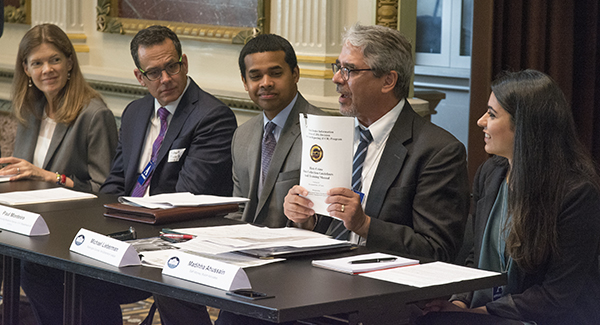
By Cherilyn Crowe
White House and other government officials released new federal policies and resources aimed at combating religious discrimination at a July 22 event. The program included members of the Know Your Neighbor coalition – a diverse group of organizations committed to increasing understanding across religious lines.
At a December 2015 White House event centered on celebrating and protecting America’s tradition of religious pluralism, the Department of Justice announced plans for a series of policy roundtables across the country focusing on issues related to religious discrimination.
Held from March through June, roundtable topics ranged from how to protect people and houses of worship from religion-based hate crimes, how to combat religious discrimination – including bullying – in education and employment, and addressing unlawful barriers interfering with the construction of houses of worship. After the roundtables, Department of Justice leaders held discussions with advocacy and religious organizations, including members of the coalition, to review the findings and develop policy recommendations.
New information, updates and policy changes as a result of the roundtables include:
• Updates on the Justice Department’s Civil Rights Division website to ensure communities know about its enforcement of laws related to hate crimes.
• A new report from the Civil Rights Division on its enforcement of the Religious Land Use and Institutionalized Persons Act, protecting the religious freedom of – and preventing discrimination against – people exercising their religion through the construction and use of property and those who are confined to institutions. The report also looks at key trends and developments in the use of RLUIPA.
• Changes to the way the Equal Employment Opportunity Commission collects demographic data from individuals who file charges, which will allow the EEOC to collect more precise data about the religion of the individual alleging discrimination. This is meant to assist the government and the public in recognizing and responding to trends in the data.
• A fact sheet for young workers from the EEOC about their rights related to religious discrimination in the workplace.
• A revised online complaint form from the Department of Education’s Office for Civil Rights to clarify when the office can investigate complaints from those who believe they have experienced racial, ethnic or national origin discrimination involving their religion.
• A new webpage from the department’s Office for Civil Rights that consolidates resources from the federal government about religious discrimination.
• Guidance for communities on how to protect their houses of worship is now highlighted on the Department of Homeland Security’s Center for Faith-based and Neighborhood Partnerships and FEMA website.
“These are significant steps forward,” said Gurwin Singh Ahuja, the organizer of the Know Your Neighbor coalition and founder of the National Sikh Campaign. “Government agencies can move slowly, but this speed and these results show their commitment to protecting everyone from religious discrimination.”

During the panel on preventing religion-based hate violence and attacks on houses of worship, Michael Lieberman of the Anti-Defamation League holds up a copy of the FBI’s Hate Crimes Data Collection Guidelines and Training Manual. His fellow panelists are (from left) Megan Mack from the Department of Homeland Security, Robert Moossy and Paul Monteiro from the Department of Justice, and Madihha Ahussain of Muslim Advocates.
The July 22 event at the White House included remarks from key administration officials, including White House Counsel Neil Eggleston, Principal Deputy Attorney General Vanita Gupta of the Department of Justice’s Civil Rights Division, and Melissa Rogers, executive director of the White House Office of Faith-based and Neighborhood Partnerships. There were two panel discussions with leaders from government agencies and groups who are part of the Know Your Neighbor coalition. One panel focused on preventing religious-based hate violence and attacks on houses of worship, and the other discussed how to confront religious discrimination in schools, workplaces and communities.
Meetings with the Know Your Neighbor coalition served as a catalyst for the December event, and the group actively pushed for policy changes to better protect religious freedom for all people and combat religion-based discrimination. The coalition members are the Baptist Joint Committee for Religious Liberty, Becket Fund, Interfaith Alliance, Center for Inquiry, Muslim Advocates, National Sikh Campaign, National Council of Churches, ACLU, Hindu American Foundation, Shoulder-to-Shoulder Campaign, Religious Action Center of Reform Judaism, Interfaith Youth Core and Islamic Networks Group.
“We are grateful for the work of the agencies as well as religious and other civil society leaders on these important issues,” Rogers wrote in a White House blog post announcing the changes. “Americans deserve to be free from religion-based discrimination. We are committed to continuing to work with our partners to make this promise a reality.”
From the July/August 2016 edition of Report from the Capital. You can also read the digital version of the magazine or view it as a PDF.




